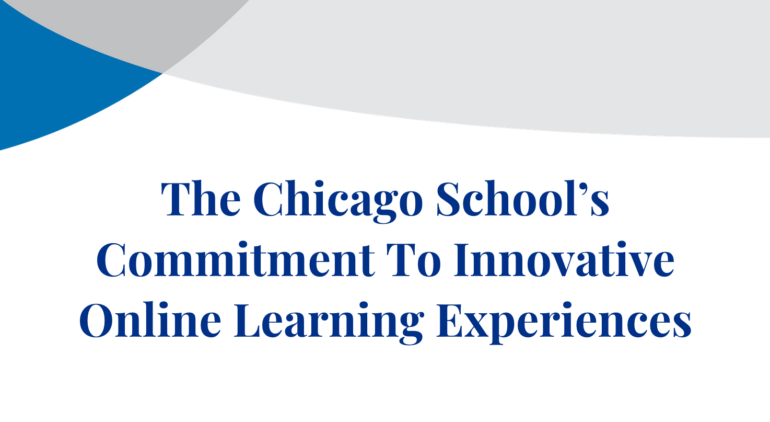The Chicago School’s online programs give students the opportunity to reach their educational and professional goals from wherever they call home. Flexible full-time and part-time online programs ranging from short-format credentials to bachelor’s degrees to doctoral degrees are offered to meet students exactly where they are in their academic journey.
“We have always championed the belief that universities should change to meet the needs of students, not the other way around.” says Bill Brown, Psy.D., provost of The Chicago School. “As students have emphasized a greater need for versatility, we’ve responded by evolving so that students can balance professional, academic, and personal responsibilities.”
Through online, cohort, and blended formats, The Chicago School’s programs help more than 2,600 students develop a dynamic understanding of their field by networking, gaining insight, and discussing thought-provoking topics with classmates, faculty, and scholars from around the world.
Online students receive the same personalized support from student advisers as those attending in-person courses, along with comprehensive career services to help graduates define their goals and maximize their degrees. This approach appeals to many students already established in their careers.
“I really appreciated that I could fit a Ph.D. program into my schedule while I worked full time,” said Kara Hans, Ph.D., a graduate of The Chicago School’s online Ph.D. in Business Psychology program. “While online learning can stereotypically feel really lonely, that wasn’t my experience at all at The Chicago School.”
“Through group chats and conversations at our program residencies, I built a community with my cohort of classmates,” adds Dr. Hans. “I really valued the opportunity to be a sponge, learning all I could from the change-makers around me in class.”
The Chicago School’s online programs offer synchronous “residencies,” through which students and faculty connect either in person or virtually for learning retreats to reinforce course content, prepare for clinical experiences, and build community. For many students, these live interactions spark deeper learning and growth.
For instance, Tamea Ryan, Ph.D., a graduate of The Chicago School’s Ph.D. Organizational Leadership program, highlights how interactions with Assistant Professor Kristijan Civljak, Ph.D., helped crystalize her academic and professional goals.
“Early on in my program, I had the chance to connect with Dr. Civljak at an in-person residency and I really felt my creativity come alive,” says Dr. Ryan. “He helped me think about the importance of approaching organizational inclusion in new ways. It all clicked for me around the importance of empowering people to own their own story so that we can build more inclusive communities.”

